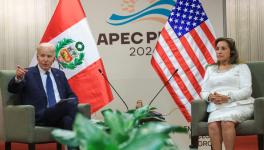Is G20 Hangzhou Summit Going to Miss the Bus Again?
After the first three, the G20 summits seem to be a series of missed opportunities. They do not address serious global problems, such as anemic economic growth, growing inequality, and tax havens. As a result, the G20 summits are in danger of growing irrelevant.
Rough Transcript:
Prabir Purkayastha (Prabir): Hello and welcome to Newsclick, this program with The Real News. We have with us Rajat Nag, former MDG, Asian Development Bank and we are going to discuss the forthcoming G-20 Summit. These G-20 summits take place now as a matter of course, there are lots of things discussed but nothing seems to happen. Do you think this summit is going to be different? In that are they going to discuss for instance the backdrop of the crisis, the fact that tax savings have played a huge role?. Do you think all this is going to play a role or is it going to be more of the same?
Rajat Nag (Rajat): I am afraid, it is more of the same. But the G-20 summits, the first three were really useful. The one in Washington in 2008 in the depth of the financial crisis and the following two in 2009, those summits dealt with what a G-20 needed to do; bring the global leadership, be decisive, take decisions, act. After that, it has tended to become very diluted by taking on a huge agenda. In 2014 in Brisbane, they discussed economics, they discussed climate change, they discussed gender, they discussed the Ebola crisis. They discussed everything and nothing comes out of it.
Prabir: But is it because the G-8 or even the G-7 or the G-5 really do not want anybody else on the table and therefore it is more for show while at the time of crisis, they really needed India and China to bail them out?
Rajat: True but I think G-8 quite frankly is becoming relevant. If you don't have G-20, you don't have big players India and China. So they need that larger group but I think what has happened is they now get into too many things, like the theme for the G-20 summit next week at Hangzhou are four Is; innovation, invigoration, interconnectedness and inclusiveness. Now, under those four Is, you can discuss anything and everything and that's what they will do. So I am afraid, it does tend to become a bit of a talk shop. But I think there is some value to having these get togethers of leaders where they can discuss issues of substance but only when it is focused and I am afraid now, it is not focused at all and therefore, I don't expect much to happen, or come out of it.
Prabir: Rajat, honestly speaking, the focus will be there if the Americans and the Europeans want something out of it. If the rest of the world wants something out of Europeans and the Americans , particularly the Americans, then the focus has to be brought by them. I will give you two instances which I think we need to get some focus. One is the issue of tax havens which is really transfer of wealth from the poorer nations to the richer nations via tax savings. Tax savings do not work as if they are the culprits. In fact, most of the tax savings are connected to major European or American financial institutions in the city of London really runs the bulk of the tax savings in the world. If something has to be done on tax savings, the world needs to move. It's really destroying the real economy in some sense particularly the poor countries. But there is no attempt to put this on the agenda and a very serious agenda.
Rajat: I would not put only on Europe or the US. Even there is no unity say between China and India or South Africa or others. So I think, the group of 20 themselves can't often agree what is it they want and therefore, yes. Obviously, some countries have more say than others but more than that, I think G-20 forum works best when there is a genuine crisis of global proportions such as happened in 2008 global financial crisis. So the forum has become a bit of a talk shop where everybody puts in their ideas. Nothing is pruned and each summit is an attempt by the chair, in this particular case, China, to put its mark or last time it was Turkey, before that Australia. So nobody says can we look at what we decided last time or the year before and they just want to add something of their own. In Turkey for example, last year again there were three Is. They had inclusiveness, they had investment, and they had integration or interconnectedness, something of that sort. So my feeling is that the G-20 as a forum needs to decide what it ist for. If it is just for meeting and talking by itself, it is no problem. It may be a bit of a waste of time. But I think, it is very important to decide what are the three top things that the world needs to look at and do it. For example, I think at the moment the biggest concern really has to be the world economy as a whole is really in a very fragile anemic state. The growth rate this year is going to be roughly about 3.1 percent. For the 5th year in a row, the growth rate will be less than the average during the period 1992 – 2007. In 2017, probably the same about 3.1-3.2. So I think the G-20 can be a very very important forum for the leaders to say what are we going to do about global economic growth, what are we going to do about some of the issues of inequality, some of the issues that you mentioned about tax havens but they don't. They always go from one issue to another. They said in 2014 in Brisbane, they discussed Ebola which was important. It doesn't need G-20 to discuss it.
Prabir: Because if you come to Ebola, the WHO is the place where it should have been discussed. G-20 is not the platform. There are a whole bunch of platforms which are platforms where these things can be discussed. G-20 has to focus on where they make the maximum impact. You are absolutely right, it is the economy where they play a major role and when you talk about global governance structure G-20 has to lead and really tax is one of the key ones in that. So the economy and uniform taxation policies which are not inimical to the poorer countries are the major things.
Rajat: I could not agree more with you. I think, the G-20 forum is really there to look at global issues and global public goods. Growth is one obviously. So what are the growth drivers and governance and exactly sort of things you are talking about. Also, the institutional arrangements and how would the IMF be made more representative, how the emerging markets gets more voiced etc. Those, I think are issues which two days of discussions at that level would be very useful. At the moment, it gets too fragmented and each country wants to get its own particular clause or sub-clause in the communique and then that becomes an end in itself.
Prabir: Do you think therefore, countries like India and China are missing the bus? They should be really driving the agenda which they are not?
Rajat: Well, you see that's the thing. This is China's turn and China is going to be the Chair and at Hangzhou, they have the four Is just as I mentioned that President Xi is very keen on. But if you look at what is it, again everything is important. Yes; innovation, yes; invigoration; yes; interconnectedness, yes to inclusiveness but what will come out of it? But, if they are focused just on economic growth and inequality., this global rise in inequality in which the richer countries are getting richer., it's phenomenal. Most of the industrialized countries, the top 10 percent have seena significant increase in income than if you take the top 1 percent. But the point is, it is the high income earners that have garnered most of the gains and the middle income or the poor have not. This is true almost universally and even in the emerging economies, inequality has worsened. Those require fairly major public policy decisions at the global level.
Prabir: This is where India and China are both equally at fault and therefore, they have no incentive to bring it up either.
Rajat: Each becomes I think, an occasion to showcase particular achievements or a particular country rather than some of this macro global public goods and unfortunately, I think other than in 2008 and 2009, each G-20 summit has frittered away an opportunity and quite frankly, therefore, when you asked me, I couldn't remember this is the 11th summit that is happening. Other than the first 3, I can't remember anything specific from the other summits which you can say was achieved.
Prabir: Also, interesting that inequality does not figure as one of the I's in this four I's. Rajat, we will come back to you after the G-20 summit to have a review of what the summit did or did not. We will treat this as a curtain raiser. This is all the time we have today in Newsclick. Keep watching our program.
DISCLAIMER: Please note that transcripts for Newsclick are typed from a recording of the program. Newsclick cannot guarantee their complete accuracy.
Get the latest reports & analysis with people's perspective on Protests, movements & deep analytical videos, discussions of the current affairs in your Telegram app. Subscribe to NewsClick's Telegram channel & get Real-Time updates on stories, as they get published on our website.
























